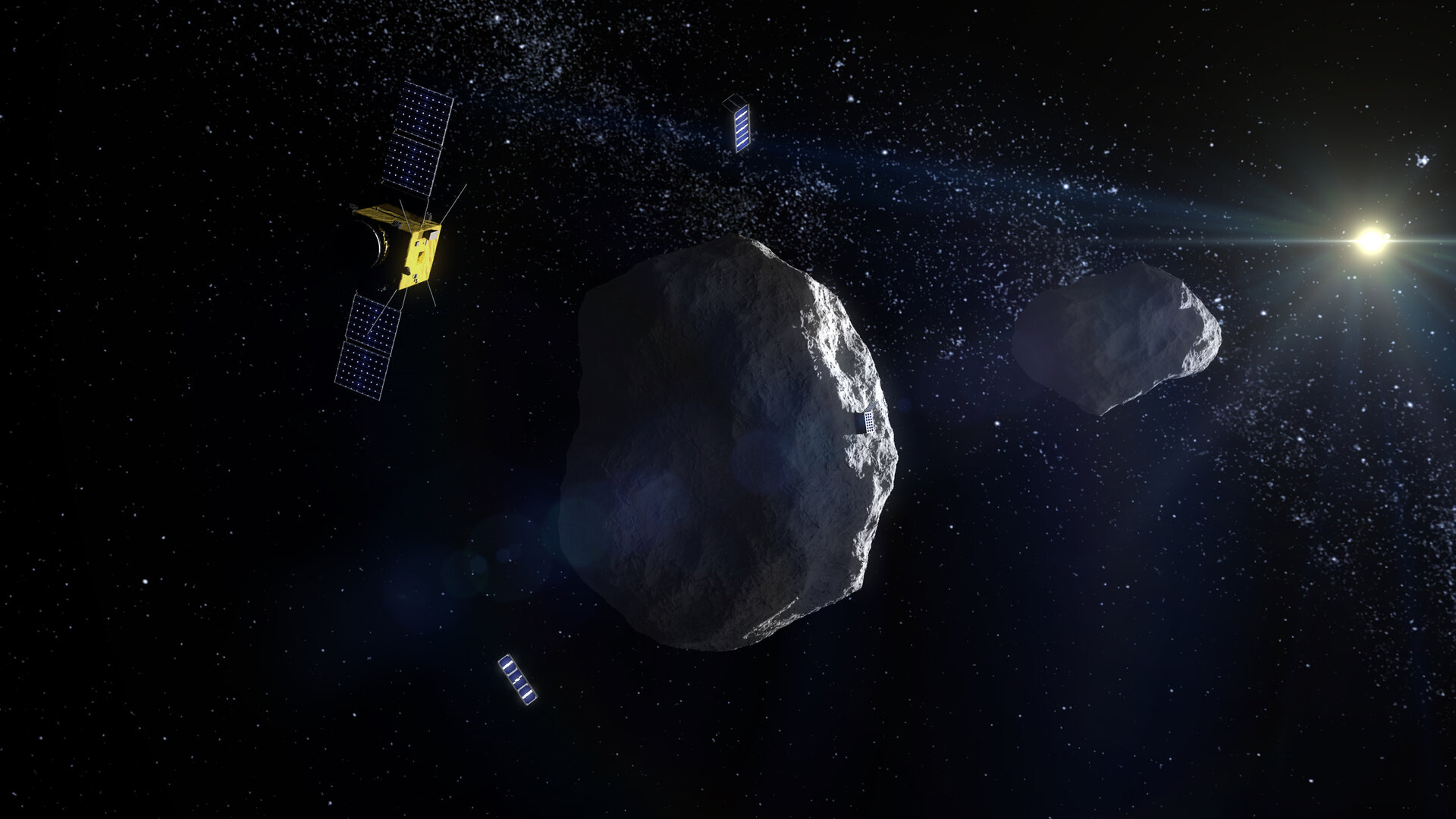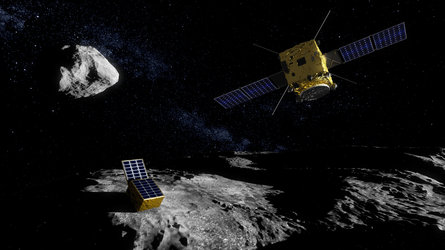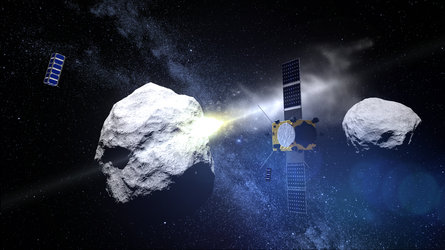Accept all cookies Accept only essential cookies See our Cookie Notice

About ESA
The European Space Agency (ESA) is Europe’s gateway to space. Its mission is to shape the development of Europe’s space capability and ensure that investment in space continues to deliver benefits to the citizens of Europe and the world.
Highlights
ESA - United space in Europe
This is ESA ESA facts Member States & Cooperating States Funding Director General Top management For Member State Delegations European vision European Space Policy ESA & EU Space Councils Responsibility & Sustainability Annual Report Calendar of meetings Corporate newsEstablishments & sites
ESA Headquarters ESA ESTEC ESA ESOC ESA ESRIN ESA EAC ESA ESAC Europe's Spaceport ESA ESEC ESA ECSAT Brussels Office Washington OfficeWorking with ESA
Business with ESA ESA Commercialisation Gateway Law at ESA Careers Cyber resilience at ESA IT at ESA Newsroom Partnerships Merchandising Licence Education Open Space Innovation Platform Integrity and Reporting Administrative Tribunal Health and SafetyMore about ESA
History ESA Historical Archives Exhibitions Publications Art & Culture ESA Merchandise Kids Diversity ESA Brand Centre ESA ChampionsLatest
Space in Member States
Find out more about space activities in our 23 Member States, and understand how ESA works together with their national agencies, institutions and organisations.
Science & Exploration
Exploring our Solar System and unlocking the secrets of the Universe
Go to topicAstronauts
Missions
Juice Euclid Webb Solar Orbiter BepiColombo Gaia ExoMars Cheops Exoplanet missions More missionsActivities
International Space Station Orion service module Gateway Concordia Caves & Pangaea BenefitsLatest
Space Safety
Protecting life and infrastructure on Earth and in orbit
Go to topicAsteroids
Asteroids and Planetary Defence Asteroid danger explained Flyeye telescope: asteroid detection Hera mission: asteroid deflection Near-Earth Object Coordination CentreSpace junk
About space debris Space debris by the numbers Space Environment Report In space refuelling, refurbishing and removingSafety from space
Clean Space ecodesign Zero Debris Technologies Space for Earth Supporting Sustainable DevelopmentLatest
Applications
Using space to benefit citizens and meet future challenges on Earth
Go to topicObserving the Earth
Observing the Earth Future EO Copernicus Meteorology Space for our climate Satellite missionsCommercialisation
ESA Commercialisation Gateway Open Space Innovation Platform Business Incubation ESA Space SolutionsLatest
Enabling & Support
Making space accessible and developing the technologies for the future
Go to topicBuilding missions
Space Engineering and Technology Test centre Laboratories Concurrent Design Facility Preparing for the future Shaping the Future Discovery and Preparation Advanced Concepts TeamSpace transportation
Space Transportation Ariane Vega Space Rider Future space transportation Boost! Europe's Spaceport Launches from Europe's Spaceport from 2012Latest

AIM at Didymos
Thank you for liking
You have already liked this page, you can only like it once!
ESA’s proposed Asteroid Impact Mission and its twin CubeSats, with its microlander in place on the smaller of the two Didymos asteroids. ESA performs a wide variety of asteroid research, and is participating in international Asteroid Day tomorrow.
AIM is proposed for launch in 2020 to be in place around Didymos in late 2022 when the NASA DART spacecraft impacts. As well as demonstrating key deep-space technologies and studying Didymoon in unprecedented detail, the mission will be ideally placed to document the effect of the impact on the asteroid body and its orbital path. AIM and DART together form the international Asteroid Impact & Deflection Assessment (AIDA).
Asteroid Day is an annual global movement to increase public awareness of potential asteroid impacts with Earth, and the importance of guarding against them. It is held each year on 30 June, the anniversary of the largest impact in recent history, the 1908 Tunguska event in Siberia.
ESA asteroid experts will be speaking at Asteroid Day events in Barcelona, Rome, Heidelberg and Munich.
Agency specialists will also be available to field questions online at a special ‘Ask Me Anything’ session on social media platform Reddit: “We are experts of the European Space Agency working on Near Earth Objects such as asteroids, their detection and deflection and the respective activities and missions – ask us anything!”
The AMA will take place at 14:45 GMT / 16:45 CEST on reddit.com/r/IAmA (but will appear there only a few hours before it starts).
The following team will answer your questions:
- Dario Izzo (DI), Advanced Concepts Team
- Michael Khan (MK), Mission Analyst
- Vasco Pesquita (VP), Systems and Concurrent Engineering Section
- Borja Garcia Gutierrez (BGG), System Simulation Engineer
- Paolo Concari (PC), Communication Systems Engineer
- Ninja Menning (NM), Head of ESA ESTEC Communication Unit
- Sean Blair (SB), Senior Editor, Space Engineering and Technology
- Marco Trovatello (MT), Cross-Media Coordinator
Tomorrow’s Asteroid Day will also see the launch of an interactive strategy game, called ‘AIM-Space Challenge’, allowing players to learn more about the AIM mission and ESA in general, developed for the Agency by students from MediaLab Amsterdam.
ESA’s Facebook page will also be hosting a couple of Facebook Live sessions from ESA’s site in Noordwijk, the Netherlands – the technical heart of the Agency. The first, at 12:30 GMT /1430 CEST, will focus on the AIM game. The second, at 13:45 GMT / 15:45 CEST, will demonstrate how AIM would navigate around its target binary asteroid system.
-
CREDIT
ESA - ScienceOffice.org -
LICENCE
ESA Standard Licence














 Germany
Germany
 Austria
Austria
 Belgium
Belgium
 Denmark
Denmark
 Spain
Spain
 Estonia
Estonia
 Finland
Finland
 France
France
 Greece
Greece
 Hungary
Hungary
 Ireland
Ireland
 Italy
Italy
 Luxembourg
Luxembourg
 Norway
Norway
 The Netherlands
The Netherlands
 Poland
Poland
 Portugal
Portugal
 Czechia
Czechia
 Romania
Romania
 United Kingdom
United Kingdom
 Slovenia
Slovenia
 Sweden
Sweden
 Switzerland
Switzerland





























